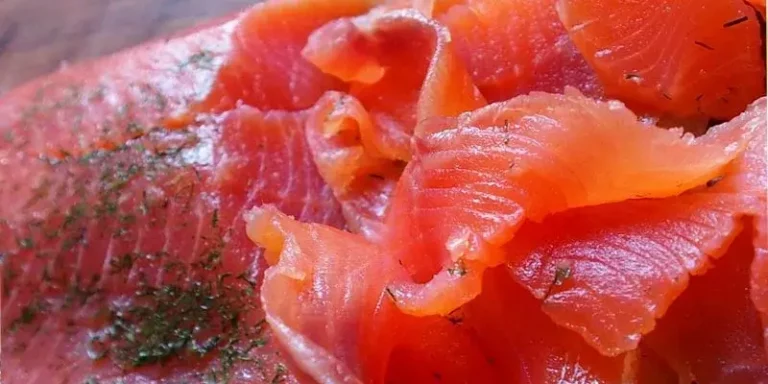Lox is a traditional Jewish dish made from cold-smoked salmon. If you have a lot of salmon in your freezer, you might be wondering if you can freeze lox.
Can you freeze lox? Yes, you can freeze lox. Ensure that the lox is fresh before freezing them. Place them into an airtight container or freezer bag for storage. Properly stored, lox will last for about 6 months in the freezer.
Does Lox Freeze Well?
Lox is a type of smoked salmon that is typically stored in the refrigerator. Lox can be kept for about two weeks when refrigerated in an airtight container, but freezing will help preserve its texture and flavor for longer periods of time.
Lox freezes well and if you need to freeze them, it is easy to freeze and preserve them for a long time. It can be stored in the freezer for up to six months.
For best results, we recommend placing the packaged fish on a tray and freezing it flat before stacking it inside a plastic bag or storage container to prevent having to use an extra bag or container.
How To Freeze Lox
There are many ways to freeze lox but we will only discuss the top two methods.
First Freezing Method
- Place the salmon, skin side down, onto a sheet of parchment paper on a baking sheet.
- Then place into your freezer until solid.
- Once frozen, transfer into a plastic container with an airtight seal or wrap tightly with aluminum foil
- Label the container and put it into the freezer.
Second Freezing Method – Vacuum Sealing
For the best quality lox and longest freezer shelf life, you should vacuum seal it.
By vacuum sealing the lox, all the air is sucked out of the bag. Since there is no air, the lox will be less likely to suffer from freezer burn.
It’s a good idea to freeze them in thin slices. This way, it will be easier and quicker to thaw.
How Long Can You Freeze Lox?
Lox is a food that has a very short freezer shelf life, which means you should freeze it as soon as possible.
Freezing your lox will slow down the bacteria growth, which will help the fish last longer.
However, it is not recommended that you freeze your lox for more than six months.
The shelf life of lox will vary depending on how long it has been frozen, the temperature at which it was frozen, and its final storage location.
The quality of the lox will also be compromised if it is exposed to heat or light while being stored.
How Do You Defrost Lox?
When it comes to lox, there are a couple of different methods that you can use to thaw them.
If you’re not in a hurry, the refrigerator is the best option. To thaw lox, remove it from the freezer, place it on a plate, and put it in the fridge. Let it sit for 4-5 hours to thaw.
If you are in rush, you can cook lox from frozen in an oven at 450 degrees Fahrenheit. Cooked it for about 10-12 minutes.
Can You Refreeze Lox?
You can refreeze lox, but it depends on how much it has thawed. If the lox has not thawed completely, which means it’s still has a lot of ice crystals on and around it, you can freeze it again. There will be no texture and flavor change.
On the other hand, if the lox has thawed completely, it’s not a good idea to refreeze them. Doing so will only cause the quality of the lox to deteriorate even further.
Other Questions about Lox
Can you freeze packaged lox?
The answer is no, packaged lox can’t be frozen. The reason it can’t be frozen is that the fish doesn’t last for more than a few days or even longer if properly stored. There are no known ways to freeze packaged lox without changing the quality of the product.
Can you freeze lox spread?
You might be wondering if you can freeze lox spread. The answer is yes in a way, but not quite.
Lox is a type of smoked salmon commonly used in cream cheese. It has white, flaky meat that can be cut into thin slices and served with bagels, crostini, or crackers. It is usually sold with its skin on to add color and flavor to the dish.
You can freeze lox spread by layering it between two pieces of plastic wrap and then freezing them for up to one month. However, when defrosted, the spread will be more crumbly than when raw because the cold temperature affects the proteins in the lox spread which causes it to break down into smaller pieces that must then be re-blended before serving.

